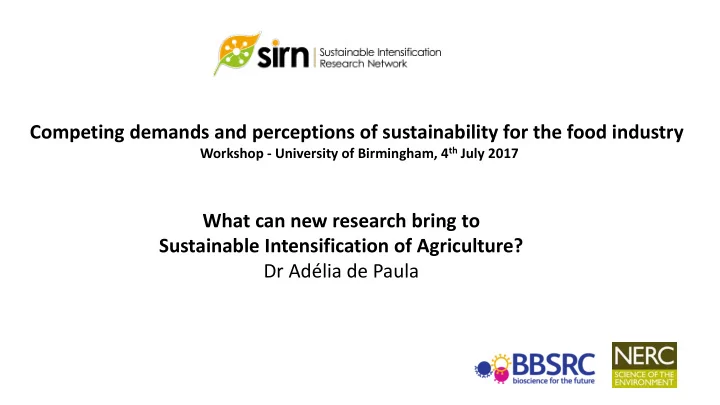

Competing demands and perceptions of sustainability for the food industry Workshop - University of Birmingham, 4 th July 2017 What can new research bring to Sustainable Intensification of Agriculture? Dr Adélia de Paula
The challenges: The global growth of fertilizer use and cereal production, 1960-2010 Source: UNEP 2011 THE GREEN REVOLUTION Responding to demands for increasing food production
“There is a pressing need for the 'sustainable intensification ' of global agriculture in which yields are increased without adverse environmental impact and without the cultivation of more land. ” Priorities for action: Promote sustainable intensification
Sustainable Intensification (SI) Sustainable intensification means simultaneously raising yields, increasing the efficiency with which inputs are used and reducing the negative environmental effects of food production. It requires economic and social changes to recognise the multiple outputs required of land managers, farmers and other food producers, and a redirection of research to address a more complex set of goals than just increasing yield. The Future of Food and Farming Challenges and choices for global sustainability
Ecological Socio-economic Intensification Intensification Intercropping Creating Enabling Environments Integrated Pest Management (IPM) Building Social Capital Conservation Farming Building Human Capital Organic Farming Creating Sustainable Livelihoods Genetic Intensification Higher Yields Improving Nutrition Resilience to Pests and Diseases Resilience to Climate Change Nitrogen Uptake and Fixation
SI examples from developing countries: Push-Pull technology in Africa
Rice-fish in Asia Trade-off and short- and long-term gains
SI requires research with more ‘systems’ orientated approaches: Holistic approach for farming, planning and management – connecting resources, production, consumption and investments Research should be participatory (diagnostic, design, evaluation and learning) Should address farmer’s priorities, strategies and resource allocation decisions Systems should be delineated by spatial and temporal boundaries Uses systematic investigation to understand interdependence Requires inter-disciplinarity Applies modern technology tools It is depended of data, information and knowledge → development of models, scenarios It is also important to provide evidence for agricultural policies
Partners and sub-contractors Examples from the UK £4.5M investment
Understanding the Designing Socio-economic systems interventions context SIP 1 - Integrated Farm Management for Metrics/indicators Integrated Farm Decision support improved economic, environmental and Management social performance (led by NIAB) practices SIP 2 - Opportunities and risks for farming Land typology Landscape scale Collaborative land and the environment at landscape scales (capability and risk) interventions management, (led by University of Exeter) performance and benchmarking SIP 3 - Markets and drivers (led by ADAS) Resilience of UK Income streams Sphere of influence farming
• Farmers attitudes and practices – adoption of new practices strongly influenced by supply chain (including farm suppliers and advisors) • The role of value chain in influencing farming practices – costumer-orientated focus to production, good relationship with buyers to secure market and premium price • Mechanisms for driving changes to SI practices – most effective are those that stimulate long-term changes in beliefs and norms which then influence the behaviours that supports SI
Achieving Sustainable Agricultural Systems ASSIST (£11 million research programme) • Develop a large-scale network of study farms & new sensor networks to undertake hypothesis-driven experimentation • Provide data, models, web portal, infrastructure & opportunities to support complementary research programmes & Horizon topics • Develop innovative farming systems in collaboration with industry and stakeholders to: Increase efficiency of food production Improve resilience to extreme events Reduce the environmental foot print of agriculture
Soil to Nutrition S2N • Identify the key processes determining nutrient use efficiency, productivity and resilience across food production systems • From soil to landscape, will provide the key mechanistic indicators necessary to direct interventions for sustainable intensification of future farming systems at the field, farm and landscape scales
The Sustainable Intensification Research Network (SIRN) • SIRN is a community network for UK researchers in agricultural, biological, environmental and social sciences • SIRN aims to: achieve better integration of research and resources and looks for innovative approaches to address SI stimulate proposals for innovative, systems-oriented research relevant to SI at the interfaces between disciplines in the biological and environmental and social sciences
Leadership team Dr Matt Heard Prof Michael Winter Prof Andy Whitmore Prof Sue Hartley Centre for Ecology Rothamsted Research University of Exeter University of York and Hydrology (Principal Investigator) Dr Adelia de Paula Rothamsted Research (Network Coordinator)
Coordination with other research groups and networks and interfaces with funders Achieving Agricultural Sustainable Systems (ASSIST) Integration of Promote, Facilitate sharing Encourage links agricultural, disseminate and Soil to Nutrition and coordination with other biological, connect activities (Optimising Nutrient Flow) of capabilities, related UK and environmental in SI research, resources of international and social and stimulate expertise activities sciences new ones
How you can get involved? • You can become a member of the network • You can subscribe to SIRN newsletter and follow SIRN on social media • You can participate in our events and discussion forums For more information: www.sirn.org.uk @SIRN_tweets
“Modern agriculture requires an innovative capacity which goes far beyond the individual farmer, researcher, industrialist, trader or adviser, even beyond the abilities of any one of their organizations or institutions.” Paul G. Engel
Recommend
More recommend